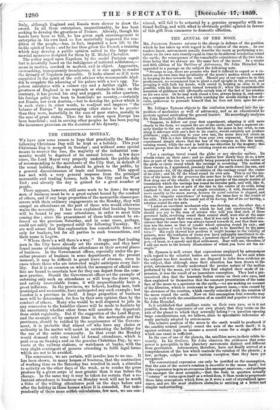THE CHRISTMAS MONDAY.
WE have now some reason to hope that practically the Monday following Christmas Day will be kept as a holiday. This year Christmas Day is merged in Sunday ; and without some special means to recover the loss, the majority of the industrial com- munity would be deprived of its annual leisure. A few days since, the Lord Mayor very properly undertook the public duty of recommending to the merchants of the City that, in default of the usual holiday, Monday should be given to the public, by a general discontinuance of trade and business. This appeal has met with a very general response from the principal mercantile and trading houses, both in the City and the West End ; and already the day is gained for a great number of people. There appears, however' still some work to be done ; for many men of business must be to a great extent bound by the conduct of others, and if any large proportion of the mercantile classes per- severe with their ordinary engagements on the Monday, they will compel an attendance on the part of those who would otherwise waive the necessity. It has been explained that banking houses will be bound to pay some attendance, in order to meet bills coming due • since the presentment of those bills cannot be en- forced on the previous Saturday, and in some cases, perhaps, could not safely be postponed until the following Tuesday. We are well aware that this explanation has considerable force, not only for bankers, but for all parties to such transactions, and. their name is Legion. "Where there's a will there's away." It appears that leading men in the City have already set the example, and they have found means of minimizing the attendance at their several places of business. In the Government offices, especially under the pe- culiar pressure of business in some departments at the present moment, it may be difficult to grant leave of absence, even in cases where those who are interested might anticipate every faci- lity. But it is an occasion on which the managers of official rou- tine are bound to ascertain how far they can depart from the com- mon practice. Should. the Government offices set the example of enforcing only such an attendance as will keep the doors open, and satisfy unavoidable forms, it will unquestionably have a great influence. In the provinces, we believe, leading men, both municipal and mercantile, have anticipated any such example ; but London is a province in itself. A large proportion of business men will be determined, far less by their own opinion than by the conduct of others. Many who would be well disposed to join in any concession to the humbler classes will be made to hesitate by the uncertainty whether other firms will sanction the departure from strict regularity. But if the suggestion of the Lord Mayor, and the example set by eminent firms in the metropolis and the provinces, should be ratified by the acquiescence of the Govern- ment, it is probable that almost all who have any choice or authority in the matter will assist in extricating the holiday for the use of the entire community. In that event the Monday would demand only some kind of formal attendance, which is paid even on Sundays and on the genuine Christmas Day, by ser- vants at the railway stations, or watchmen at banks, with the very slight contingent of persons attending to fulfil legal forms which are not to be avoided.
The concession, we are certain, will involve loss to no one. It has been shown, in many bowies of business, that the contraction of working time on the Saturday has resulted in such a stimulus to activity on the other days of the week, as to render the gross produce by a given corps of men greater than it was before the change. In the same way it may be taken for certain that a re- luctant attendance to business on Monday week will not be worth a tithe of the willing attendance paid on the days before and after the holiday in those houses where it is conceded. But inde- pendently of those more selfish calculations, few men, we are con-
vinced, will fail to be actuated by a genuine sympathy with na- tional feeling, and with what is obviously public opinion in favour of this gift from commerce to domestic affection.


























 Previous page
Previous page